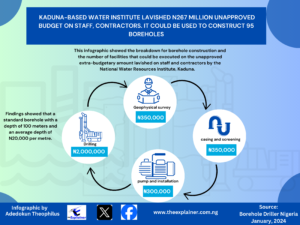THE NATIONAL Water Resources Institute has been indicted for lavishing over 267 million naira on staff and contractors working for the institute.
This was revealed in the annual report of the Auditor General of the Federation on the non-compliance, and internal control weaknesses in ministries, departments and agencies of the government for the year 2021.
This amount of two hundred and sixty-seven million six hundred and sixty-seven thousand, nine hundred and thirty-two naira, eighty kobo (N267,670,932.8) was withdrawn from the Capital Development Fund.
The report stated that the payments were not appropriated for the 2021 fiscal year of the institute.
The payments were extra-budgetary expenditures and it contravened the sections of the Financial Regulations (2009).
Paragraph 301 of the provision explains that the annual estimates and appropriation act are instruments used to limit and arrange the disbursement funds of the Federal Government.
It stressed that no expenditure should be incurred except on the authority of the warranty issued by the Minister of Finance.
It states, “No expenditure may be incurred by any officer on any service, whether or not included in the estimates until he has received an authority to do so in accordance with any of the following provisions in these rules and regulations.
“Any officer controls a vote, or part thereof, who incurs expenditure without such authority does so on his sole responsibility and will consequently be held peculiarly responsible for his actions.”
The report suggested that the extra-budgetary expenditure should be remitted to the Treasury account.
Reacting to the auditor general’s finding, the institute’s management explained that the expenditures are in line with the 2021 Annual estimates and appropriation” International Conference on establishment of Jabi Lake is captured under counterpart Funding for UNESCO Regional Centre for Integrated River Basin Management (RC-IRBM).”
The institute further stressed that students’ activities, matriculate NWC and others were fully captured in the 2020 appropriation.
What Can the National Water Resources Institute do with 267 million naira with Extra-Budgetary Expenditures?
Amid the economic crises and water scarcity in rural communities which is related to the institute’s mandates, The Explainer provided context for capital projects that may be carried out using the institute’s unapproved extra-budgetary spending lavished on contractors and staff.
The Explainer found out the cost of installing a borehole facility in a community from Borehole Driller Nigeria, a company that offers full borehole services like drilling, pump installation, tank stand construction, flushing, pump servicing, borehole fishing, and thorough surveys for the best possible water supply.
The Explainer’s findings confirmed that the cost of digging a borehole in Nigeria is often determined on a per-meter basis.

Drilling expenses typically vary between N11,000 and N20,000 per metre. Findings showed that drilling a standard residential borehole that is around 100 metres.
Several other expenses need to be taken into account in addition to the drilling.
These expenses include:
A geophysical survey which is aimed at finding the ideal drilling location and the depth of the water table cost between N50,000 and N150,000.
In addition, casing and screening are provided to prevent the borehole from abrupt collapse and filter out sediments. The Explainer learnt that this also cost varies from N200,000 to N350,000 based on the borehole’s diameter and depth.
Additionally, the cost of the pump and installation might range from N150,000 to N300,000. The price of electrical components is also included in this.
ALSO READ: How NABTEB Failed to Remit ₦154 Million IGR to FG Coffers
It was discovered that the drilling cost two million naira using a standard borehole with a depth of 100 meters and an average depth of N20,000 per metre.
Adding two million naira (N2,000,000) for drilling, ₦150,000 as the average cost of a geographical survey with ₦350,000 for casing and screening and ₦300,000 for pump and installation revealed that it cost an average of two million and eight hundred thousand naira (N2,800,000) to construct a standard borehole.
With a sum of two million and eight hundred thousand naira (N2,800,000) as the cost for a standard borehole, The Explainer divided this sum from the excess unapproved fund that the institute spent on staff and contractors.
The Explainer, however, found out that an average of 95 boreholes could be constructed in various rural communities with the amount frivolously spent by the institute






















